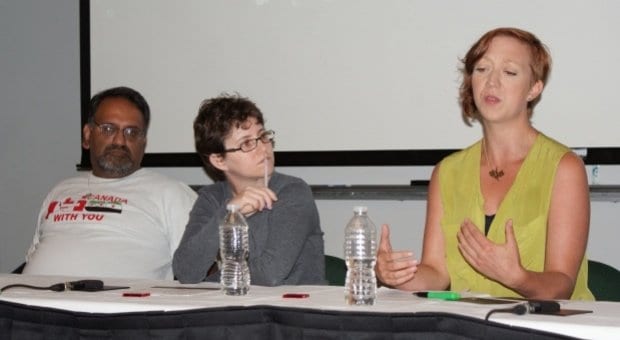The Vancouver Queer Film Festival’s decision not to include any Israeli government-funded feature-length films in its 2013 program was applauded by some and questioned by others at an often-fractious Aug 23 forum on whether to boycott Israeli films.
“Why and Why Not? Cultural Boycott?” brought together four panellists with a range of perspectives on free expression, dialogue and the efficacy and intricacies of cultural boycotts, specifically in relation to peace and justice between Israel and Palestine.
Festival programmer Shana Myara reminded the approximately 50 people who attended the forum at Simon Fraser University’s (SFU) downtown campus that an Israeli short film was presented this year.
The festival has not signed on to the boycott.
Panel moderator Elise Chenier, an associate professor of histories of sexuality at SFU, explained that the boycott dates back to 2004 when the Palestinian Campaign for the Academic and Cultural Boycott of Israel, a group based in Ramallah, a Palestinian city in the central West Bank 10 kilometres north of Jerusalem, called for a boycott of Israeli academic and cultural institutions.
That, Chenier said, led to high-level Israeli meetings, an outcome of which was a move to change the country’s image, including a move to embrace gay tourism in an effort to appear progressive.
Panellist Sarah Schulman, the author of 16 books, most recently Israel/Palestine and the Queer International and the co-founder of the MIX NYC Queer Experimental Film Festival, agreed that the rebranding was an attempt to make Israel seem more progressive.
“You can now support gay rights and not be progressive,” said Schulman, who describes Palestinians as “a profoundly oppressed people.”
“It is completely inappropriate for our community-based film festivals to accept Israeli government funds,” Schulman said.
Myara said that although the Vancouver Queer Film Festival has not decided to boycott Israeli films, organizers wanted to ensure through the forum that there was a chance to debate the issue.
“We chose the best program possible for this year,” she said. “There were Israeli titles to choose from.”
Matt Salton, festival director for the Reelout queer film and video festival in Kingston, Ontario, said festivals should be mindful of what material they present since films can be influential.
“In last year’s festival, we received multiple packages of films from Israel,” he noted. “I didn’t understand why we were suddenly on the radar for Israel. Now it makes sense because there is this [rebranding] campaign out there.”
Panellist Imtiaz Popat, of Muslim queer group Salaam Vancouver, said the queer community has become a target market for the rebranding of Israel.
But, he said, the queer community cannot talk about its own emancipation unless it deals with that of other communities.
He noted that Salaam marched in the Vancouver Pride parade a few years ago in support of Queers Against Israeli Apartheid (QuAIA). He told the audience that UBC’s Hillel House, a Jewish group, also marched in the parade that year, only to counter QuAIA’s message with its own.
“The message was ‘Israel is a champion of queer rights’ — a pinkwashing,” Popat maintained.
Not so, said forum audience member Jonathan Lerner, a volunteer with a number of Vancouver Jewish organizations.
“We registered for the parade long before it was known that QuAIA was participating,” Lerner told Xtra. “Our group’s participation was not in response to QuAIA’s attendance, but rather out of a genuine desire to show support for the queer community. The group was organized by queer Jewish students and their allies. We have since marched in three of the last four years. The year we didn’t march, we had a booth at the Sunset Beach Pride Festival instead.”
Lerner questioned how boycotting a specific nation’s culture could be reconciled with Canadian values of non-discrimination.
Schulman said she believes the global Boycott, Divestment and Sanctions (BDS) movement is the most effective non-violent way to pressure the Israeli government to change its policies toward Palestinians.
Xtra Vancouver editor Robin Perelle, who also sat on the panel, said she was not persuaded by arguments to boycott films.
“Films are voices,” Perelle said. “Voices should be heard.”
“It’s hard to share stories when the films telling them can’t be seen.”
She said Israeli funding of films may be self-serving, but the films can still spark discussion.
Audience members questioned why the Israel government shouldn’t back filmmakers when the National Film Board often finances those in Canada.
The panel was criticized for having neither Jewish nor Palestinian representatives. Chenier said an effort was made to get a Palestinian person on the panel.
“We do regret that,” she said. “None of this was due to lack of effort on the part of the organizers.”

 Why you can trust Xtra
Why you can trust Xtra


